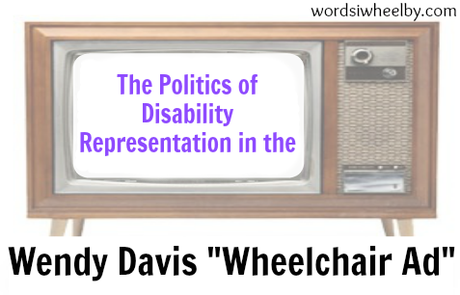First visit? Glad you're here! I hope you'll take a second to stop by my Facebook page and subscribe for updates so we can stay connected!
 Follow
Follow

In case you haven’t noticed the dramatic media storm over the past few days, Texan senator and gubernatorial candidate Wendy Davis’s most recent advertisement against her competitor, Attorney General Greg Abbott, has enraged quite a lot of people. Since I’m someone who always looks at disability in the media through a careful critical lens, a few people have assumed I’d be equally disgusted with Davis’s supposed affront to Abbott. To be honest, though, I firmly believe people are overreacting. Much of society harbors some concerning double standards that are clearly evident in the responses to Davis’s ad.
First, consider the fact that Abbott mentions his disability in order to use it as a selling point in one of his own campaign ads. Set to uplifting background music, Abbott pushes himself up the inclines of a parking garage, narrating the story of how he worked to rebuild his strength after his accident. These rehabilitation efforts are framed as the perfect metaphor for Abbott’s leadership style if elected as the governor of Texas. Viewers are left with a message intended to inspire confidence in Abbott: “To get to the top we must push ourselves to do ‘just one more.'” So, if he can push his wheelchair to the top of a parking garage even in the face of exhaustion, then this must also mean he can push Texas to the top against all odds. There’s no real substance in the ad, no mention of Abbott’s accomplishments or policies. It’s just heartwarming fluff. The ad directly takes advantage of Abbott’s disability.
Conversely, Davis’s ad about Abbott is set to ominous background music and tells of how Abbott fought to help himself after his accident, but has not helped others who have been in similarly difficult situations. This ad is far from the offensive blow people have made it out to be. Abbott already brought his accident and his disability into the conversation by creating the parking garage ad, so mention of his disability is fair game. This is politics, after all, and it’s a tough playground out there.
Yes, Davis’s ad uses Abbott’s disability, but only as a springboard for the main point, which is to highlight what her campaign team believes to be Abbott’s wrongdoings and character flaws. Though there are major differences in the tone and intent of the ads, both use the same rhetorical techniques – exploitation of disability and tragedy to hit a nerve and convince people that Abbott is a certain type of person.
If the public is okay with Abbott creating a campaign ad centered on his disability, then it’s hypocritical to be angry at Davis for mentioning it. Really, the crux of the issue is that too many people believe disability is something that must be tip-toed around; how dare someone say something negative about a disabled person? Mother Jones writer Ben Dreyfuss exemplifies this mentality perfectly in his critique: “It’s offensive and nasty and it shouldn’t exist. She’s basically calling Abbott a cripple.” This response is outrageous and way off-base. Nowhere in the ad is it even implied, let alone said, that Abbott is nothing more than a cripple. Dreyfuss and so many other angry critics are essentially ascribing their own stereotypes to the ad, a belief that disability makes a person untouchable. This, I believe, is the actual nerve that the ad hit for so many people.
Ultimately, Davis’s ad is undeniably propagandistic and hard-hitting, but so are many of the hypocritical responses that stem from the fact that the ad is in stark contrast to the way people are used to hearing about disability. If disability is portrayed in a way that makes non-disabled people feel warm and fuzzy – as it is in Abbott’s parking garage ad – then most people have no problem with it. (For a prime example of this, look no further than my critique of the Guinness wheelchair basketball advertisement and the comments calling me bitter.) But in the case of Davis’s ad, it seems the campaign team did indeed cross a line, but not the line of what is appropriate, as they are so accused. Rather, they’ve crossed the line of the public’s comfort zone surrounding disability.
Photo credit: KendallKaos / Foter / CC BY-NC-SA
Like what you read? Subscribe for weekly updates and be sure to confirm your e-mail!

